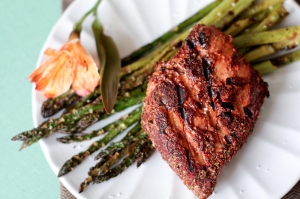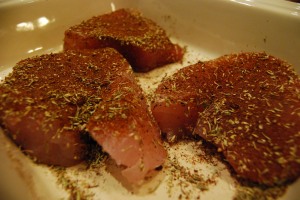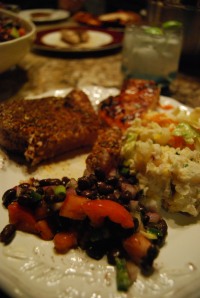Dinner number two complete! And this one was completely different from the last. Instead of the rugged, earthy nature of “The Last of the Mohicans” feast, we had a very American, very modern dinner in the style of Fourth of July picnics. There was potato salad, coleslaw, grilled chicken…everything you’d expect from everybody’s favorite American holiday. Too bad the book it was based on was anything but a happy occasion. I didn’t mention it in the book review (because I didn’t know), but The Senator in this story is none other than Ted Kennedy and this all REALLY HAPPENED. Maybe I should have paid more attention in history class. History never really was my thing. Ask me the name of the author that wrote Oroonoko or We Wear the Mask, and I can tell you. Ask me if I know when the Civil War started or which states seceded from the union and you’ll see an embarrassed look on my face because I think I should know these things, but dates and the like don’t stick. However, I think I’d remember another horror story involving the Kennedys, in which the drunken Senator drove off the road and into the “black water” of the swamp on Chappaquiddick Island, Maine, and then escaped the sinking wreck, leaving the woman in the car with him, Mary Jo Kopechne, to die a watery death. Why? Because it sounds like a story. And I remember stories. But, as usual, our grammar school history classes like to brush all the bad stuff under the rug, thinking maybe if they don’t teach us, we’ll never find out, and go on believing that we have a shiny, perfect government and it’s the REST of the world who’s dark and twisted. But I’m not about to get into the ethics of modern day American politics. I’ll stick with what I do know: food and literature.
This time around, I made dinner for my dad and stepmother, as well as for my uncle and cousin who are down from Snohomish, Washington for a lacrosse tournament. It was fun to make a 4th of July-esque meal in the middle of January, especially since the 80 degree weather we’ve been having lately feels a lot more like July than January. I was a little worried that Oates wasn’t going to mention food at ALL in this novel, and I’d have to write about my night drinking vodka tonics (what the Senator was double-fisting while driving forty miles an hour around hairpin curves on a dirt road) and beer. Not that I, for one, would really mind. But luckily, almost at the end of the book, there was suddenly a list of everything Kelly Kelleher ate on her last day on Earth. Score. And so, without further ado, here’s the menu. And just like last time, because I want to give credit where credit is due, if you click on these first several pictures, as well as on the following links, you’ll be directed to the blog they came from. Verbal thank yous to Honey, What’s Cooking?, Closet Cooking, What’s Cookin, Chicago?, Our Life in the Kitchen, and Back to Her Roots. Thanks for adding such great recipes!
And so, with no further ado, The Menu, as pertains to Joyce Carol Oates’ harrowing version of what happened, from the victim’s point of view, on July 4th, 1969, in her novel Black Water:
Avocado and Black Bean Salad
Sesame and Ginger Coleslaw
(OK maybe I deviated a little from standard American coleslaw but I wasn’t about to eat anything that had two cups of mayonnaise in it…)
Potato Salad
Chipotle Honey Grilled Chicken
Grilled Blackened Tuna Steaks
Jealous, aren’t you? One thing I definitely have to work on is taking more pictures. I just get so caught up in all the chopping, mincing, bringing to a boil, mixing, marinating madness that I forget. Cooking really is a dance. A dance in which, if you forget a couple of steps or focus so much on your footwork that you’re as stiff as a board, you end up ruining the whole thing. I’ll work on it, I promise.
Cooking in my dad’s kitchen is both a blessing and a curse. It’s a blessing because he has all these awesome culinary gadgets that most kitchens don’t have, like an extendable water spigot over the stove so you don’t have to walk from the sink to the stove with a heavy pot full of water, or a butcher block island, so you don’t need to worry about cutting boards. You just chop everything right on the island. It’s pretty cool. But it’s a curse because my dad’s kitchen is HUGE and has (and I swear I’m not exaggerating) about 50 cupboards, of varying sizes. When I ask him for something like the 3/4 teaspoon, he says, “it’s in the ‘all things measuring’ drawer,” as if I had the faintest idea which drawer that was. Or, if I need a can of black beans: “look in the ‘all things canned drawer.'” It drives both me and my brother, when he’s around, nuts. I refuse to navigate the Bermuda triangle of my dad’s kitchen if he’s not there. It would be an exercise is frustration, I tell you.
Oh, and another problem I have: I ALWAYS forget that chicken needs to marinate for at least an hour. So, without fail, I get towards the end of my chopping, grating, zesting frenzy, thinking I’m almost done, while whoever’s waiting to be fed politely (or not) lets me know that they’re getting quite peckish, when suddenly I realize I haven’t marinated the chicken yet. SO ANNOYING. And I did it again tonight, but other than that it went well.
That’s my bean salad. Really yummy.
Those are my tuna steaks, with homemade blackening seasoning. I have no experience with fish, really. And neither does my dad, who did all the grilling. The tuna was good, but I think we may need to hone our searing skills. Or, at least, I do. My dad’s what he calls “fish challenged” because raw fish gives him the heebie jeebies so I don’t think he’ll be anxiously anticipating his next meal of seared tuna. That’s his “fish challenged” face above. But I already knew that, so to make sure everyone enjoyed the dinner, we had the chicken as well.
It was really tasty. The marinade was super easy to make, using only chipotle peppers in adobo sauce, honey, and cilantro. Next time I make this though, I’ll make sure to marinate it before I start doing everything else, because I think more time in the marinade could only mean good things for this chicken.
Vodka tonics! Classy and tasty. For anybody who likes vodka, Vox is actually a really good one, and it’s only about 17 bucks. INFINITESIMALLY better than Smirnoff and, I think, better than Absolut or Gray Goose. This is also my favorite picture of the night.
Voilá! Dinner a la story of a skeezy American Senator who left a woman to die. I feel bad having this much fun about something really terrible. But at least I learned something new, however unpleasant, about American history. And now, because as usual this post is way too long, until next time. I have to go enjoy the dessert expressly mentioned in the book: Häagen Dazs vanilla ice cream. I’m already reading the next book, which is Fear of Flying by Erica Jong. So far, the only eating that’s going on would be more appropriate for a blog (or site) that focuses more on, say, adult entertainment…Hopefully, Jong will mention SOMETHING else so I can do the food portion. I do really like the book so far though. It’s all about girl power!
Thanks for reading!












